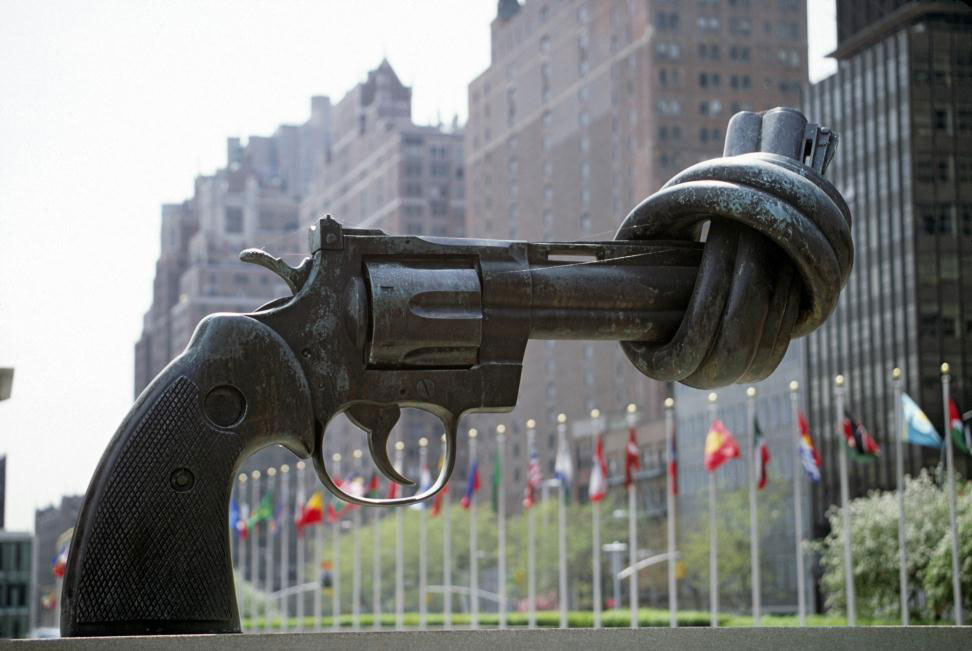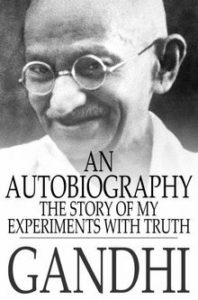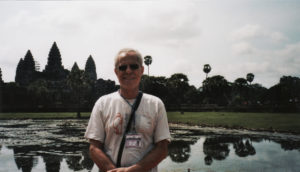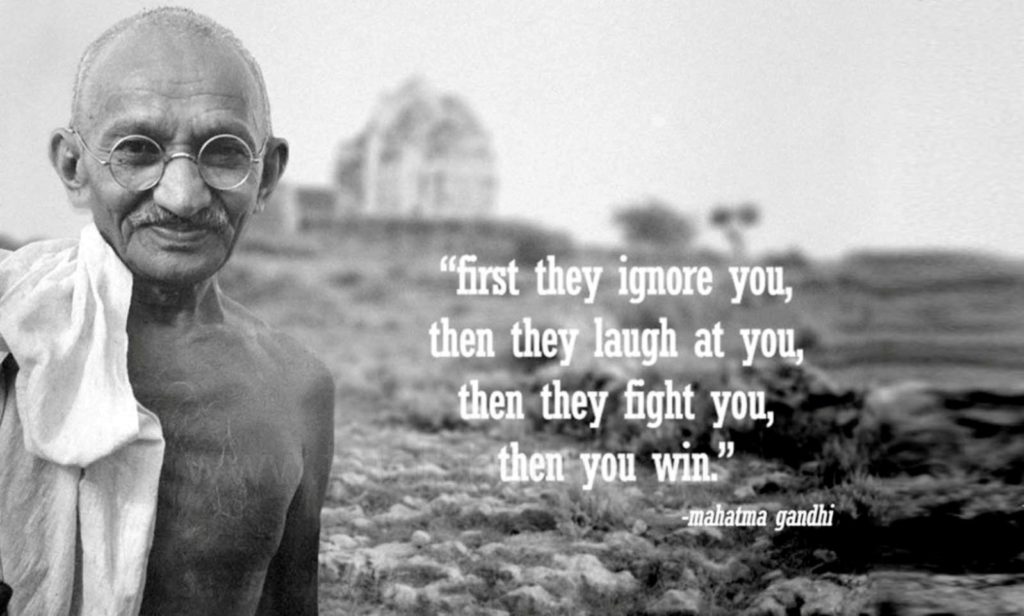October 2: Nonviolence Day, Gandhi’s Birthday
TMS PEACE JOURNALISM, 3 Oct 2016
Antonio C. S. Rosa | Editor – TRANSCEND Media Service
“The International Day of Non-Violence is marked on 2 October, the birthday of Mahatma Gandhi, leader of the Indian independence movement and pioneer of the philosophy and strategy of non-violence.” — un.org
Thus starts the UN Resolution that on 15 June 2007 formalized the legacy of one the most prominent figures of the 20th Century, born 1869 dead 1948 and still ahead of his time in 2016. Yet, in the short span of 9 years this celebration has already become merely symbolic, ceremonial, practically meaningless. Gandhi Jayanthi as it is called in India. Myths can be useless and also misleading. So let me stick to the man and his meaning to humans.
Let’s remind ourselves of the worldwide wars, proxy-wars, invasions, occupations, terrorisms (State and private); slaveries/tortures of various kinds, human trafficking, forced human mass displacements, persecutions of minorities, economic exploitation, and cruelty to animals. Governments, TNCs, the arms industry, and the top 1%—the elites– profit from all of the above across religious, political, cultural, national, ideological, geographical divides (the globalization). 
Such elites will provide narratives for why they have to kill, mutilate, exploit, and cause pain & suffering. And the masses will swallow their vile interpretations and rewritings of reality with a religious apathy and disconnection from reality. And that despite Internet, cell phones, social media, instant communications, and all the gimmicks that supposedly bring info, knowledge, culture, literacy to them. Pessimism? Realpolitik? Realism? Take your pick. History at its best.
But it doesn’t matter the amount or prevalence of violence employed or practiced anywhere anytime. It was from within a violent environment, which oppressed him both in South Africa and in India, that the Mahatma, born Mohandas Karamchand Gandhi, gave birth to his philosophy of nonviolence. Yin-Yang. The world is readier than ever for it. Nevertheless, besides a philosophy NV can be many things for many people depending on contexts.
Gandhi reminded us that conflicts are natural occurrences. “Honest differences are often a healthy sign of progress.” They may arise from incompatible goals (Galtung). Nonviolence is one way of responding to conflicts whether at a personal, familiar, social, or political level (Micro- Meso-Macro-Mega levels: Galtung). Another response is the use of violence. Nonviolence is therefore a means to conflict resolution or transformation. Peace by peaceful means.
Because conflicts are symptoms of damaged relations, it is in the relationships that they are to be addressed, not in the parties–as a starting point. For if you steal my bicycle, and we fight over it, before ‘making peace’ you must return the stolen bike: common justice as a prerequisite.
Nonviolence can also be a political strategy to achieve a public goal or set of goals. The difference between strategy and tactics is that strategy is done above the shoulders whereas tactics are done below the shoulders, someone said. NV can be used as both, in tandem, defensively or offensively, a tool, a skill, an art: Civil Disobedience. Besides being a way of life, ahimsa.

“Non-Violence,” a sculpture by Karl Fredrik Reutersward, sits permanently outside UN Headquarters in New York.
A most popular quote of Gandhiji is: “Be the change you want in the world.” The change starts in the person; nonviolence starts here—a design for living.
In his only book, The Story of My Experiments with Truth: An Autobiography, a collection of articles he wrote for Young India around 1927, Gandhi repeats many times the maxim that guided his actions throughout his life: Truth is God. Not God is truth, which would be a mere attribute, like God is love, God is light, God is the father. In his consciousness, Truth comes before God. Not mere semantics or a slogan but a principle to live–and die–for. Aptly, he named his movement Satyagraha (satya “truth”; agraha “insistence” or “holding to”).
It was this depth of commitment to truth and principle that Gandhi brought to the table and to his nonviolent interventions, which resulted in the retreat of the biggest empire of the time from India. Independence was not granted; it was conquered, but without bloodshed of the oppressors.
Sir Winston Churchill gave this unflattering description of Gandhi:
“It is alarming and also nauseating to see Mr Gandhi, a seditious middle temple lawyer, now posing as a fakir of a type well known in the east, striding half-naked up the steps of the viceregal palace, while he is still organising and conducting a defiant campaign of civil disobedience, to parley on equal terms with the representative of the kingemperor.” (India Today)
As the resistance and instances of civil disobedience swelled, Churchill announced: “I hate Indians. They are a beastly people with a beastly religion, breeding like rabbits.” Such was his hatred for the successful nonviolent uprising and Gandhi.
 God was never separated from Gandhi’s actions. His understanding of nonviolence implied the need for virtue in the satyagrahi, the practitioner of NV. A few quotes of his:
God was never separated from Gandhi’s actions. His understanding of nonviolence implied the need for virtue in the satyagrahi, the practitioner of NV. A few quotes of his:
“Nonviolence is the greatest virtue, cowardice the greatest vice—nonviolence springs from love, cowardice from hate.”
“The weak will never forgive. Forgiveness is the attribute of the strong.”
“My imperfections and failures are as much a blessing from God as my successes and my talents and I lay them both at His feet.”
“Fearlessness is the first requisite of spirituality. Cowards can never be moral.”
“Faith is not something to grasp, is a state to grow into.”
It was here that Gene Sharp and others diverted from Gandhi’s approach to NV. Sharp tried to transform nonviolent actions into mere instruments that could be carried out by any party seeking any objective however lowly either could be. This is not the place to elaborate on this, but I encourage readers and students to research further.
Gandhi gave a new meaning to the concept of civilization. In the 19th Century, the British spuriously classified peoples and races as Civilized, Barbarians or Savages insofar as their ‘evolution’ vis-a-vis Darwin’s theory of the survival of the fittest. They placed themselves, the white Anglo-Saxons, at the top of this food chain as the civilized ones. Barbarians were all non-Europeans such as Arabs, Indians, Asians; and Savages were the sub-Saharan Africans, natives from the Americas and Islanders. All non-white.
Gandhi redefined, imparted a new meaning to the term ‘Civilization’ with his concept of ‘Nonviolence’ as the way of truly civilized persons and cultures, of relations, mediation of conflicts; a necessary first step for the abolition of war as institution. For by eliminating the violence (smoke) mediators can look into the source of conflicts (fire)—and work on them. The soft side of all religions mandate nonkilling of humans, but Gandhiji expanded it to all forms of life: ahimsa.
Gandhi’s legacy was felt also inside of India with the abolition of the caste system by law. He renamed the Untouchables as Harijans or children of God. But, like racism in the USA, also outlawed, it had little impact on society. Laws cannot and do not erase traditions and customs ingrained in people’s minds and in deep culture. His own wife, Kasturba, would not agree in sharing their table with harijans, as he wished.
He did everything in public, with the masses he loved. He ate, prayed, fasted, slept, worked in their presence. His stomach was the weakest part of his body as he suffered from a chronic diarrhea that forced him to use diapers at times.
The Mahatma did not win a Nobel Peace Prize despite being nominated. The excuse was that he was not a man of peace, he fought against the British Empire [and dared to win—I’d say]. He was rather of the naïve persuasion, as many of us are; not a hawk, a personality trait essential for success in business and politics today. Case in point, the rat race we witness to the White House.
Last act: Mahatma Gandhi was shot dead on Jan 30, 1948 by Nathuram Godse. He was a high level brahmin deeply worried about Gandhi’s aberrations in the direction of Buddhism and on Nehru’s line of modernization (hence the court process was secret). He also wouldn’t accept what in his view was Gandhi’s partiality toward Muslims in the partition of India into India/Pakistan. He asked forgiveness before pulling the trigger. Upon falling, Gandhiji uttered his last word: “Rama.” One of God’s names in India.
________________________________________
Antonio Carlos Silva Rosa, born 1946, is the editor of the pioneering Peace Journalism website, TRANSCEND Media Service-TMS, an assistant to Prof. Johan Galtung, and Secretary of the International Board of the TRANSCEND Network for Peace, Development and Environment. He completed the required coursework for a Ph.D. in Political Science-Peace Studies (1994), has a Masters in Political Science-International Relations (1990), and a B.A. in Communication (1988) from the University of Hawai’i. Originally from Brazil, he lives presently in Porto, Portugal. Antonio was educated in the USA where he lived for 20 years; in Europe/India since 1994.
Tags: Ahimsa, Conflict, Gandhi, Nonviolence, Oppression, Philosophy, Satyagraha, Strategy, Truth
This article originally appeared on Transcend Media Service (TMS) on 3 Oct 2016.
Anticopyright: Editorials and articles originated on TMS may be freely reprinted, disseminated, translated and used as background material, provided an acknowledgement and link to the source, TMS: October 2: Nonviolence Day, Gandhi’s Birthday, is included. Thank you.
If you enjoyed this article, please donate to TMS to join the growing list of TMS Supporters.

This work is licensed under a CC BY-NC 4.0 License.
One Response to “October 2: Nonviolence Day, Gandhi’s Birthday”
Read more
Click here to go to the current weekly digest or pick another article:
TMS PEACE JOURNALISM:


Thank you for writing this commemoration of Gandhi! You’ve packed a lot of good info into a relatively short review of his life and work. I shall save this to my files, so I may re-read and re-read.
Gandhi’s quotes, some of which you’ve noted here, are worth inscribing on stone, in marble, in our hearts and minds. And you have provided a framework for understanding more deeply.
Gandhi has been a hero of mine since I was about 16 and first read his autobiography and biographies about him. (I especially liked your asides and comments about Churchill here! It is amazing how an ignorant racist, imperialist and warmonger like Churchill should be so celebrated in the West and the life and ideas of Gandhi so denigrated!)
“Truth is God.” Not simply, as most would have it, “God is Truth”–making Truth an aspect of Divinity–but a merging! So simple, so difficult, and so profound!
Gandhi’s emphasis on “courage”–in its multiple forms–marks him as a bellwether for his time, our time, all time. What is courage? What is Truth? Pondering Gandhi’s life and work, we come to a better discernment.